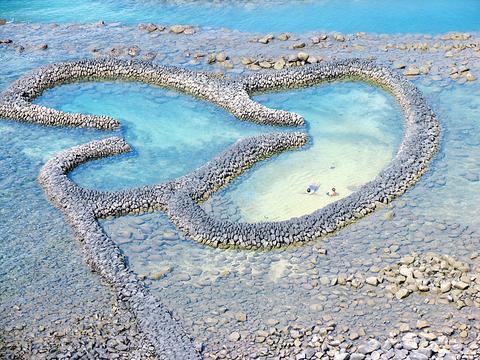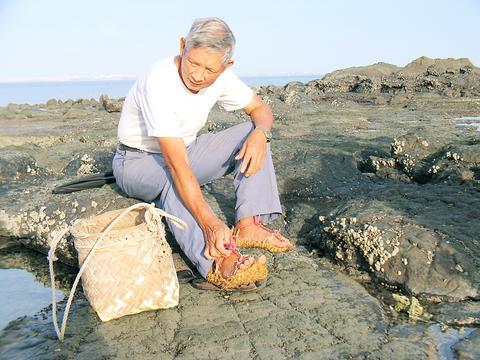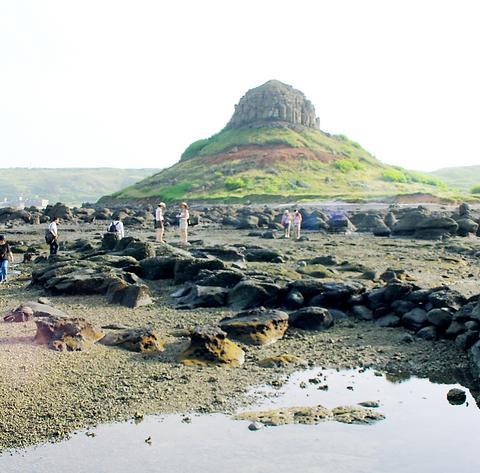Yang Chin-hua
Historians say stone weirs were first built in Penghu 700 years ago. The origins of most aren't known because they were public works; anyone in the community who could lift a rock and wanted to eat had incentive to help with construction. Because they eventually succumb to the tides, they have to be maintained.

PHOTOS: DAVID MOMPHARD, TAIPEI TIMES
But to call folks like Yang fishermen isn't entirely correct. Penghu's traditional lifestyle was equal time spent catching fish (often building a weir to catch more) and time spent coaxing crops out of infertile soil.

In farming, too, they built walls. On every island in the archipelago where crops have been cultivated, locals have stacked coral to protect their plants from the fierce winds that scour the archipelago in the winter months. Kilometers of meter-high walls crisscross the islands in a honeycomb pattern that is as pleasant to look at as it is practical.
But the stone weirs that trap fish have captured people's fancy, as well; none more than Twin Heart (

Yang's fish trap isn't the tourist trap that Twin Heart is. Mention Twin Heart, and he grimaces.
There are no young couples coming to photograph themselves in front of his fish trap -- there's no birds-eye vantage point from which to get it all in frame. And even if they could, no couple would want to be photographed in front of a fish trap called Cow's Heart (
Yang was out of luck in terms of materials to build his weir, too. Where Twin Heart sits beneath a cliff that has supplied an ample amount of basalt stones for its construction, Yang had to carry stones from the base of Turtle Mountain, a promontory of basalt rising 70m above sea level and hundreds of meters to the west. He used large pieces of coral in building it, as well, but said the heavier basalt didn't wash away as easily in the tide.
Yang started work on the project as a boy, helping his dad. A half-dozen able-bodied young locals who agreed to work for a share in the spoils joined them. The group piled stones by hand, one stone at a time, across an area the size of a football field. It took the better part of a decade.
How many fish does it catch in an average tide?
"Oh, maybe none. Not many," Yang said. "Fewer than it used to."
Though they've brought Yang his dinner all his life, the tides have slowly changed for Penghu. For the first half-century of Yang's life, his native Hsiyu was, in effect, more of an island than it is now. In the late 1970s, bridges connected it to Baisha and Matsu islands, making the three, in effect, one large island. About the same time, commercial air flights connected them to Taiwan proper. Then everyone left for paid work and a more modern lifestyle. Yang figures the folks that helped him stack his stone trap were among them.
"I haven't seen them here in a while," he said.

Towering high above Taiwan’s capital city at 508 meters, Taipei 101 dominates the skyline. The earthquake-proof skyscraper of steel and glass has captured the imagination of professional rock climber Alex Honnold for more than a decade. Tomorrow morning, he will climb it in his signature free solo style — without ropes or protective equipment. And Netflix will broadcast it — live. The event’s announcement has drawn both excitement and trepidation, as well as some concerns over the ethical implications of attempting such a high-risk endeavor on live broadcast. Many have questioned Honnold’s desire to continues his free-solo climbs now that he’s a

Lines between cop and criminal get murky in Joe Carnahan’s The Rip, a crime thriller set across one foggy Miami night, starring Matt Damon and Ben Affleck. Damon and Affleck, of course, are so closely associated with Boston — most recently they produced the 2024 heist movie The Instigators there — that a detour to South Florida puts them, a little awkwardly, in an entirely different movie landscape. This is Miami Vice territory or Elmore Leonard Land, not Southie or The Town. In The Rip, they play Miami narcotics officers who come upon a cartel stash house that Lt. Dane Dumars (Damon)

Francis William White, an Englishman who late in the 1860s served as Commissioner of the Imperial Customs Service in Tainan, published the tale of a jaunt he took one winter in 1868: A visit to the interior of south Formosa (1870). White’s journey took him into the mountains, where he mused on the difficult terrain and the ease with which his little group could be ambushed in the crags and dense vegetation. At one point he stays at the house of a local near a stream on the border of indigenous territory: “Their matchlocks, which were kept in excellent order,

Today Taiwanese accept as legitimate government control of many aspects of land use. That legitimacy hides in plain sight the way the system of authoritarian land grabs that favored big firms in the developmentalist era has given way to a government land grab system that favors big developers in the modern democratic era. Articles 142 and 143 of the Republic of China (ROC) Constitution form the basis of that control. They incorporate the thinking of Sun Yat-sen (孫逸仙) in considering the problems of land in China. Article 143 states: “All land within the territory of the Republic of China shall